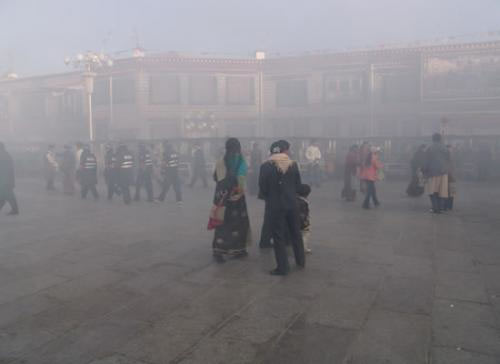
Celebrations at the Barkor in Lhasa after the Dalai Lama was awarded the U.S. Congressional Gold Medal of Honor. A tense atmosphere in Lhasa has been described as similar to ‘martial law’, with increased numbers of troops on the streets and Tibetans prevented from organizing celebrations or in some cases even attending monasteries to make offerings.
Tibetans in Tibet celebrated the award of the Congressional Gold Medal to the Dalai Lama last Wednesday despite a stepping up of security and severe restrictions on religious practice in Lhasa and areas of eastern Tibet.
One of the major monasteries in Lhasa, Drepung, is sealed off and surrounded by armed troops after police stopped an attempt by monks to peacefully mark the honor to the Dalai Lama last week. Another significant monastery in the city, Nechung, is also apparently closed. Tibetan sources report a buildup of armed police in the city, checkpoints on roads out of Lhasa, and an order to Lhasa citizens not to carry out any religious or celebratory activities.
Several Tibetans were detained temporarily and are now said to have been released after celebrations with fireworks and prayers were held at Labrang (Chinese: Xiahe in Gansu province) monastery in the Tibetan area of Amdo (see images below). Armed police stopped fireworks being set off and surrounded the monastery with armed troops. According to eyewitness reports, police clashed with monks and laypeople and there may have been some injuries.
According to other reports, internet bars were closed in some areas, and two well-known Tibetan websites, focusing on Tibetan language and literature, were closed down – one of them on the day the 17th Party Congress opened in Beijing (October 15).
The Voice of America broadcast the Congressional Gold Medal award ceremony live to Tibet via radio, television and the internet last Wednesday, although it is unclear how many Tibetans would have been able to witness the broadcast, given high levels of jamming of VOA’s service to Tibetan areas, especially towns and cities, by the Chinese authorities. One report indicated that satellite receivers in Amdo may have been confiscated over the past week in order to attempt to prevent viewing of the ceremony.
Crackdown in Lhasa during week of Gold Medal honor and Party Congress
Hundreds of monks and pilgrims are apparently still held inside Drepung monastery in Lhasa after an incident in which monks were forced to stop whitewashing the Ganden Podrang at the monastery, the former residence of the Dalai Lamas in the early 16th century, in symbolic celebration of the Congressional Gold Medal award.
People’s Armed Police troops moved in to stop the monks from whitewashing the walls on the morning of the Congressional Gold Medal ceremony, and according to one account, monks quietly left for their morning prayers. But when they resumed their whitewashing afterwards, the troops used force to stop them, and the Hong Kong newspaper Ming Pao reported that one monk was hit on the head with a baton. Ming Pao reported ‘violent clashes’ between hundreds of monks and police over the incident – but it could not be confirmed that monks had resisted or engaged in any violent confrontation with the armed troops.
According to several reports, a large number of armed troops are now stationed outside the monastery, preventing monks and pilgrims from entering or leaving. Local sources reported that some monks may have been detained and others injured (Times Online, October 22). Details have been difficult to confirm because of a climate of fear in Lhasa inhibiting the gathering of information.
In the last few days, checkpoints have been installed on roads leading to and from Lhasa, with local people describing the environment as similar to that of ‘martial law’. A Tibetan source said: “There is restricted travel for all of the people in the city and searches of vehicles going in and out, which is very unusual since March 1989 [when martial law was officially imposed following nearly three days of pro-independence protests in the city]. Buses to all the monasteries were stopped and the city is full of police.”
At the beginning of last week, which also marked the opening of the 17th National Party Congress in Beijing, Lhasa citizens were subject to more severe restrictions than normal. According to reliable reports, all government workers were told not to go to monasteries, and to refrain from taking part in any religious or celebratory activities during the week.
Another Tibetan source, writing in Chinese on a website outside China that remains open despite the closure of some blogs inside China over the past few days, commented that the banning order on celebrating the award had not appeared to be a deterrent in Lhasa. In a blog entitled: ‘The Dalai Lama receives the Congressional Gold Medal, terror and celebration combine in Lhasa’, the source wrote: “In and around the Barkhor on October 17 there were activities celebrating the Dalai Lama receiving the award from four o’clock in the morning until the afternoon. One by one, people in traditional Tibet dress made their around the Barkhor. Even though peasants selling ‘sang’ [incense] had been driven out of Lhasa beforehand by the authorities, people in the city still produced sang [incense] from their travel bags and burnt it at several altars along the route of the Barkhor.”
Despite the closures of Tibetan blogs, many Tibetans in Tibet and China discussed the Gold Medal ceremony online. One posting from Tibet said: “I am an ordinary Tibetan and I don’t actually care if Gyalwa Rinpoche [the Dalai Lama] receives any medals; I have but one wish, and that is for him to return to the holy city of Lhasa!” Another said: “There are spirits watching over us – that I believe. Gyalwa Rinpoche has done so much for us from his home for which we can only dumbly and mutely shed tears of gratitude, but we ourselves are not impotent and there is so much we can and should do, we can do more and yet more…”
Beijing had repeatedly protested to the US government not to honor the Dalai Lama. In a statement on Friday (October 19), Foreign Ministry spokesperson Liu Jianchao said that the move “is a blatant interference with China’s internal affairs, which has severely hurt the feelings of the Chinese people and gravely undermined the relationship between China and the US.”
The tension in Lhasa and other areas of Tibet coinciding with the Gold Medal ceremony and the Party Congress in Beijing takes place in the context of an intensified political campaign in Tibetan areas against the Dalai Lama. The stepping up of rhetoric against the Tibetan exiled leader coincides with a period when the Dalai Lama himself has recently met with several world leaders, including President Bush and German Chancellor Angela Merkel, and is increasingly respected for his leadership on peace and non-violence.
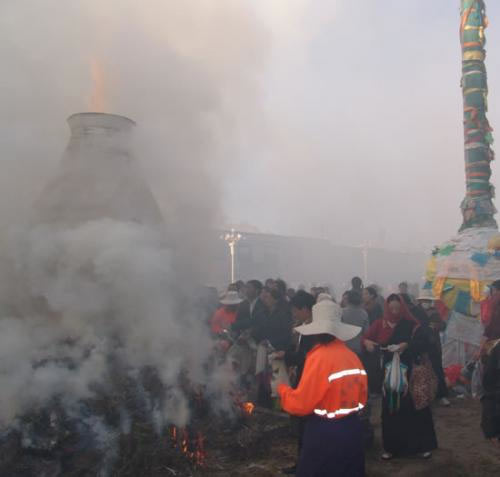
Tibetans celebrate at the Barkhor in Lhasa on Oct. 17 after the Dalai Lama was awarded the Congressional Gold Medal of Honor by the U.S. Congress.
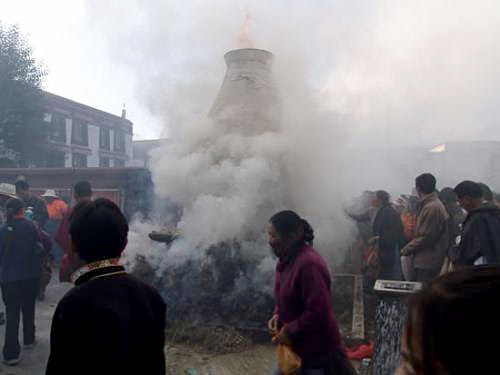
Tibetans at the Barkhor in Lhasa celebrate the Dalai Lama receiving the Congressional Gold Medal of Honor on Oct. 17, 2007.
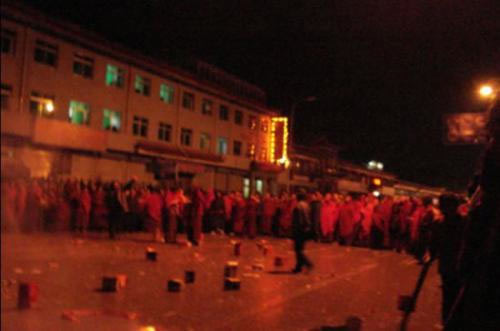
Celebrations with fireworks and prayers were held at Labrang (Chinese: Xiahe in Gansu province) Monastery in the Tibetan area of Amdo on Oct. 17, 2007.
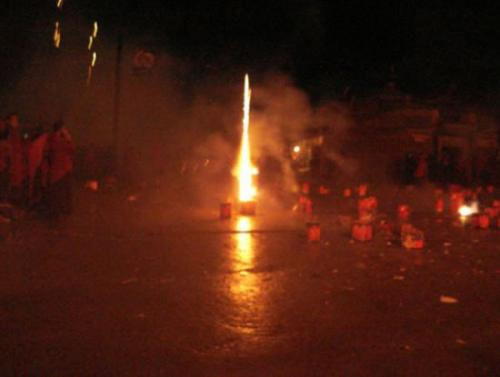
Fireworks in celebration of the Dalai Lama being awarded the U.S. Congressional Gold Medal of Honor were let off at Labrang (Chinese: Xiahe in Gansu province) in the Tibetan area of Amdo on Oct. 17, 2007.
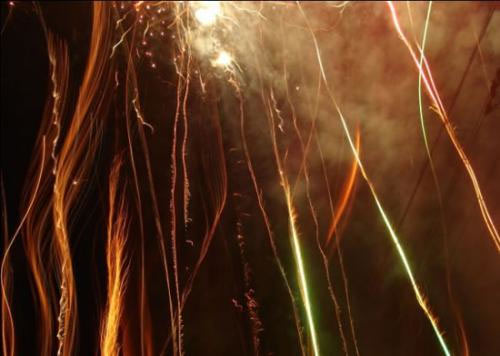
Fireworks at Labrang, Oct. 17, 2007.
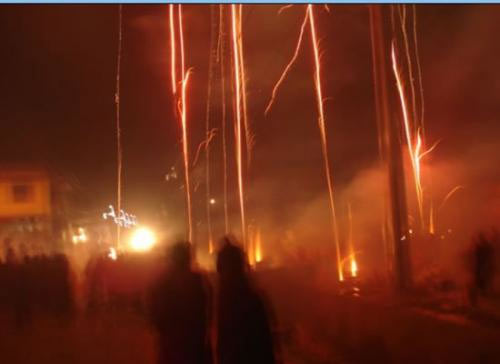
Fireworks at Labrang, Oct. 17, 2007.

